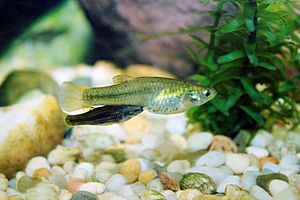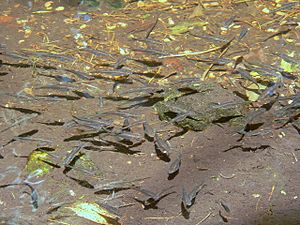Gila topminnow facts for kids
Quick facts for kids Gila topminnow |
|
|---|---|
 |
|
| Conservation status | |
| Scientific classification |
|
| Kingdom: | Animalia |
| Phylum: | Chordata |
| Class: | Actinopterygii |
| Order: | Cyprinodontiformes |
| Family: | Poeciliidae |
| Genus: | Poeciliopsis |
| Species: |
P. occidentalis
|
| Binomial name | |
| Poeciliopsis occidentalis (S. F. Baird & Girard, 1853)
|
|
| Script error: The function "autoWithCaption" does not exist. | |
| Synonyms | |
|
Heterandria occidentalis S.F. Baird & Girard, 1853 |
|
Script error: No such module "Check for conflicting parameters".
The Gila topminnow or charalito (Poeciliopsis occidentalis) is a small fish. It belongs to the Poeciliidae family, which includes many live-bearing fish. You can find this fish in parts of Mexico and the United States.
Contents
What it Looks Like
The Gila topminnow has a long, curved body. Male fish are usually smaller than females. Males are rarely longer than 25 mm (0.98 in) (about 1 inch). Females can grow up to 50 mm (2.0 in) (about 2 inches) long.
This fish often has a white belly. Its back is usually darker. The scales have dark outlines, and there is a dark stripe along its side.
Where it Lives

The Gila topminnow once lived in many places. It was found all over the Gila River area. This included parts of Arizona, New Mexico, and Mexico.
Today, you can mostly find them in the Gila River area of Arizona and Mexico. They are not as widespread as they used to be.
Life Cycle and Habits
The Gila topminnow used to be the most common fish in the Gila River area. These fish reproduce internally. This means the eggs are fertilized inside the female's body.
Reproduction
The breeding season for Gila topminnows is usually from April to November. A female fish gives birth to 10 to 15 young fish at a time. These young fish grow up quickly. They can become adults in just a few weeks to several months.
What They Eat
Gila topminnows are omnivores. This means they eat both plants and animals. They feed on things like detritus (dead plant and animal matter). They also eat small crustaceans called amphipods. However, their favorite food is often aquatic insect larvae, especially mosquito larvae.
Where They Live
This type of fish likes to live in shallow, warm water. They often prefer the water found in the beginning parts of rivers, called headwater springs.
Gila topminnows are very tough fish. They can survive in water that is almost freezing. They can also live in water as warm as 100 °F (38 °C). They can even live in water with different levels of pH (from 6.6 to 8.9). They can also survive in water that ranges from fresh to salty.
Protecting the Gila Topminnow
The Gila topminnow is an endangered species. This means their numbers are very low. There are several reasons why they are in danger.
Threats to Survival
One big problem is the mosquitofish. This fish was brought into their habitats. Mosquitofish eat the Gila topminnow's young. They also compete with the topminnow for food.
Other threats include losing their homes. This happens because of water projects and changes to their habitat. Erosion from roads and long periods of dry weather (drought) also harm their living spaces.
Conservation Efforts
To help save the Gila topminnow, some fish are being raised in special places. Fish from Sharp Spring are kept and bred at the Dexter National Fish Hatchery & Technology Center. This center is in Dexter, New Mexico. The goal is to raise enough fish to release them back into their natural homes. This helps to increase their numbers in the wild.
See also
 In Spanish: Guatopote para niños
In Spanish: Guatopote para niños
 | Leon Lynch |
 | Milton P. Webster |
 | Ferdinand Smith |


